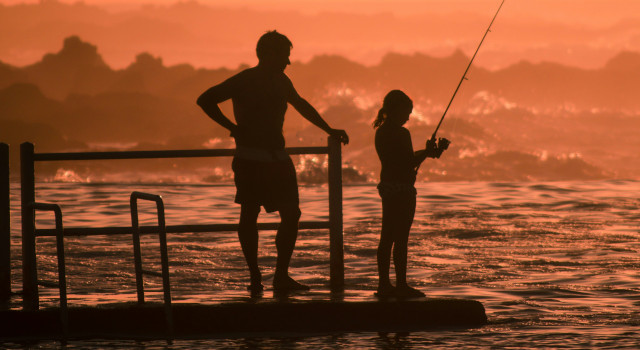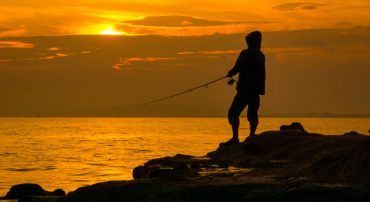 A gone-fishing portfolio is a portfolio of just a few stocks which should weather the ups and downs of the market fairly well while only rebalancing twice a year. We recommend a gone-fishing portfolio for people who are just getting started with investing.
A gone-fishing portfolio is a portfolio of just a few stocks which should weather the ups and downs of the market fairly well while only rebalancing twice a year. We recommend a gone-fishing portfolio for people who are just getting started with investing.
For those who would like assistance with investing, rebalancing, and managing their portfolio, our Do-It-Yourself service level may be a better fit.
For people with more invested assets or who are in or near retirement, we recommend professional management and financial planning. For that reason, our calculators do not make recommendations beyond age 70.
Our standard gone-fishing portfolio can be used at any custodian. It is best at custodians where there are no transactions fees for Exchange-Traded Funds (ETFs). We also have a Vanguard-specific portfolio due to the Vanguard brand loyalty of some of our readership.
If you are just getting started with investing and have not yet selected a custodian, we recommend opening accounts with Charles Schwab. Charles Schwab and many other custodians have no transaction fees for U.S. security trades and have no minimum account requirements. For these and many other reasons, we recommend selecting Charles Schwab as your custodian and using the Default Gone-Fishing Portfolio.
Here are all of our gone-fishing portfolios for 2024:
Marotta’s 2024 Gone-Fishing Portfolio Calculator
This gone-fishing portfolio is our default portfolio which can be used at any custodian.
Marotta’s 2024 Vanguard Gone-Fishing Portfolio Calculator
We recommend this gone-fishing portfolio for investors with brand loyalty to Vanguard.
This year, we did not make any changes to the Vanguard-specific gone-fishing portfolio.
For our standard gone-fishing portfolio, we made two changes.
Exposure to China
Our Investment Committee has been monitoring the potential threat of a war with China over Taiwan. During the war on Ukraine, the United States banned Americans from buying Russian stocks and bonds. One of our main concerns, if this conflict with China escalates, is that the U.S. might put similar investment controls on Chinese investments. To offset this risk, we added an ex-China fund to our main Emerging Market strategy in 2023, and this year, we increased our allocations.
While in our main portfolios, we are not fully out of China, the question is open what we should do in our gone-fishing portfolios.
To reflect this open question, we have noted the Emerging Market allocation as either Columbia Emerging Markets Core ex-China ETF (XCEM) or Vanguard FTSE Emerging Markets ETF (VWO). VWO is the Emerging Market ETF which has China exposure. XCEM is the Emerging Market ETF which excludes China.
For investors who don’t mind complexity, you could use a 50-50 allocation between these two funds. For investors who would prefer simplicity, you can select one or the other depending on your feelings about the threat of China. You can read more about this topic in “Executive Summary of the Possible Taiwan Conflict (June 2023).”
As of now by default if we had to pick, our recommendation is XCEM, because we think you can capture roughly the same return with less geopolitical risk. However, this is an ongoing situation. To stay abreast of our latest thinking, be sure to subscribe to our newsletter and watch for articles about Emerging Markets.
Freedom Update
There is always a bit of tension in the foreign allocation of our gone-fishing portfolio. Our complete freedom investing strategy involves twelve different countries in a roughly equal weight. Obviously, using twelve ETFs to represent foreign stocks is too many for a simple portfolio. However, investing in just four of the countries produces a wilder return.
Previously, we decided to invest in the four countries with the highest four-year average composite freedom scores. This year, we have continued that decision.
During the 2024 Index of Economic Freedom Update, the four countries with the highest four-year average composite freedom scores changed. To implement that change in this portfolio, we added iShares MSCI Sweden ETF (EWD) and removed iShares MSCI New Zealand ETF (ENZL).
This makes our four countries in order of composite score: Denmark, Singapore, Switzerland, and Sweden.
For investors who do not mind complexity or who have highly appreciated positions in iShares MSCI New Zealand ETF (ENZL), you could continue to hold ENZL and simply add EWD.
Reminder: Stay the Course
We have a saying, “It is always a good time to have a balanced portfolio.” While the worries of the world can make investing a terrible spectator sport, you can choose not to watch. You don’t have to watch the news or your portfolio’s reaction to the news. Seven out of ten years are up.
We strive to utilize a portfolio strategy that does not require market timing to be successful. We think the contrarian effect of rebalancing on a historically justifiable portfolio gives the best chance of weathering the market ups and downs.
For this reason, our advice is to stay the course. It is always a good time to have a balanced portfolio.
Photo by Cristian Palmer on Unsplash. Image has been cropped.

